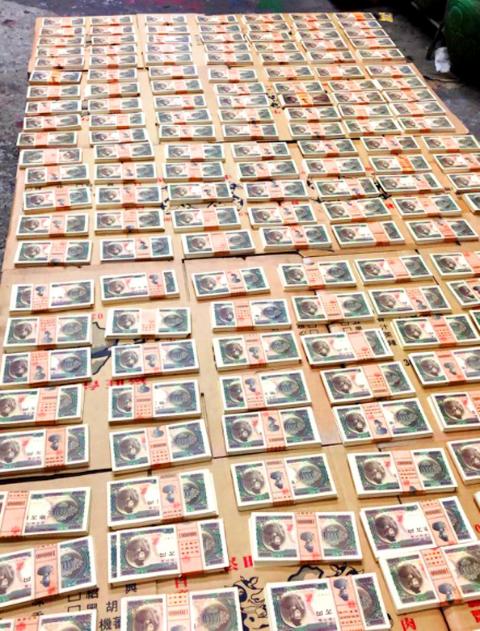A New Taipei City woman has been detained for allegedly colluding with a counterfeiting ring in China that forged Japanese yen, US dollars and Deutsche marks that could fool experts, the Coast Guard Administration (CGA) announced yesterday.
“This is the largest currency counterfeiting case we have cracked in recent years,” Investigation Branch head Ruan Wen-chieh (阮文杰) said.
The 67-year-old women, surnamed Chen (陳), was apprehended yesterday and is being charged with breaches of the Smuggling Penalty Act (懲治走私條例) and securities forging offenses.

Photo: CNA
A raid of Chen’s residence in New Taipei City’s Yingge District (鶯歌) last week uncovered billions in forged bills — ¥228 million (US$2.05 million), US$3 million and 4 billion Deutsche marks (US$2.3 billion).
The bust was the result of cooperation between Taiwan and Japan, Ruan said, adding that in 2017, Japanese authorities told their Taiwanese counterparts about a Taiwanese woman who had been smuggling counterfeit Japanese yen to Okinawa.
“Our agency formed a task force and has been monitoring the case for more than one-and-a-half years,” Ruan added.
“It is very rare to see such sophisticated forgery of Japanese yen bills, because of the difficulties involved. The Japanese mint uses very special materials to create the paper for their currency and they add unique coloring agents that give a slight yellowish tone to the bills,” he added.
Whenever counterfeit bills were discovered in Japan, they would send their experts to Taiwan to examine the forgeries, he said.
Chen in 2012 set up a company for the smuggling operation and took trips to China to meet with a forgery ring, and would smuggle counterfeit Japanese yen on her return flight to Taiwan, investigators said.
Chen reportedly had a sales catalogue made up for her customers and also sold the forged bills to intermediaries, who profited by selling the fake bills or spending them at stores, they said.
Investigators estimate that Chen smuggled about ¥500 million in counterfeit yen from China to Taiwan over the years, saying that she allegedly sold about half of the bills for 15 to 20 percent of their face value.
“We believe that some customers transferred the counterfeit bills to other countries in Asia, while the fake US bills and Deutsche marks were sold in Japan, as they can serve as collateral for private loans there,” Ruan said.

MAKING WAVES: China’s maritime militia could become a nontraditional threat in war, clogging up shipping lanes to prevent US or Japanese intervention, a report said About 1,900 Chinese ships flying flags of convenience and fishing vessels that participated in China’s military exercises around Taiwan last month and in January last year have been listed for monitoring, Coast Guard Administration (CGA) Deputy Director-General Hsieh Ching-chin (謝慶欽) said yesterday. Following amendments to the Commercial Port Act (商港法) and the Law of Ships (船舶法) last month, the CGA can designate possible berthing areas or deny ports of call for vessels suspected of loitering around areas where undersea cables can be accessed, Oceans Affairs Council Minister Kuan Bi-ling (管碧玲) said. The list of suspected ships, originally 300, had risen to about

DAREDEVIL: Honnold said it had always been a dream of his to climb Taipei 101, while a Netflix producer said the skyscraper was ‘a real icon of this country’ US climber Alex Honnold yesterday took on Taiwan’s tallest building, becoming the first person to scale Taipei 101 without a rope, harness or safety net. Hundreds of spectators gathered at the base of the 101-story skyscraper to watch Honnold, 40, embark on his daredevil feat, which was also broadcast live on Netflix. Dressed in a red T-shirt and yellow custom-made climbing shoes, Honnold swiftly moved up the southeast face of the glass and steel building. At one point, he stepped onto a platform midway up to wave down at fans and onlookers who were taking photos. People watching from inside

Japan’s strategic alliance with the US would collapse if Tokyo were to turn away from a conflict in Taiwan, Japanese Prime Minister Sanae Takaichi said yesterday, but distanced herself from previous comments that suggested a possible military response in such an event. Takaichi expressed her latest views on a nationally broadcast TV program late on Monday, where an opposition party leader criticized her for igniting tensions with China with the earlier remarks. Ties between Japan and China have sunk to the worst level in years after Takaichi said in November that a hypothetical Chinese attack on Taiwan could bring about a Japanese

The WHO ignored early COVID-19 warnings from Taiwan, US Deputy Secretary of Health and Human Services Jim O’Neill said on Friday, as part of justification for Washington withdrawing from the global health body. US Secretary of State Marco Rubio on Thursday said that the US was pulling out of the UN agency, as it failed to fulfill its responsibilities during the COVID-19 pandemic. The WHO “ignored early COVID warnings from Taiwan in 2019 by pretending Taiwan did not exist, O’Neill wrote on X on Friday, Taiwan time. “It ignored rigorous science and promoted lockdowns.” The US will “continue international coordination on infectious